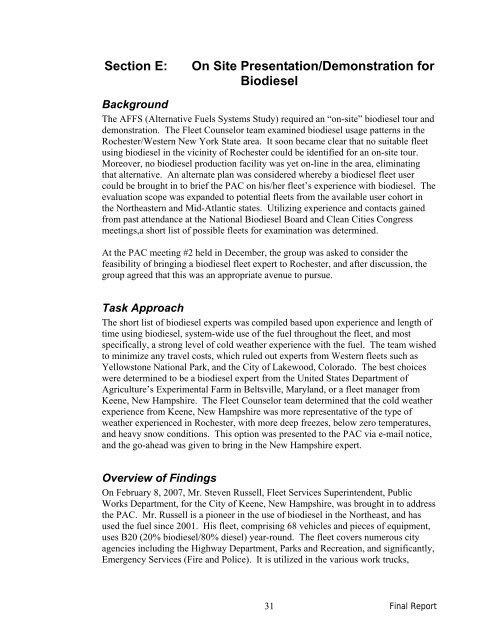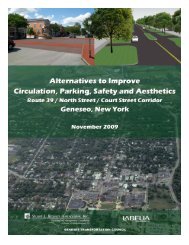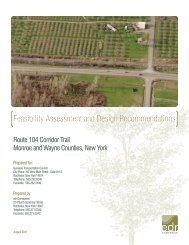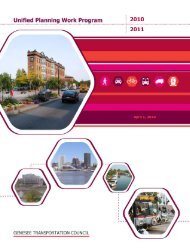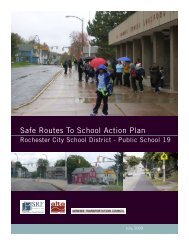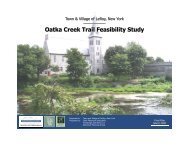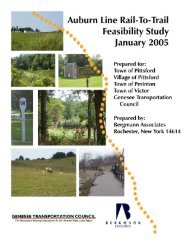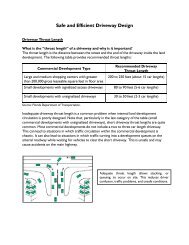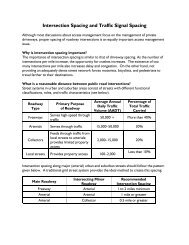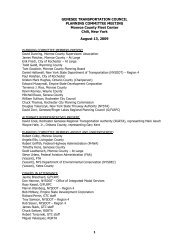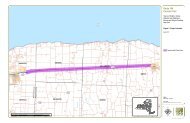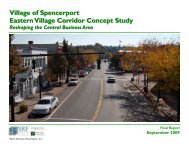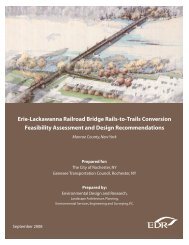Final Report Rochester Vehicle Fleet Alternative Fuels Systems Study
Final Report Rochester Vehicle Fleet Alternative Fuels Systems Study
Final Report Rochester Vehicle Fleet Alternative Fuels Systems Study
You also want an ePaper? Increase the reach of your titles
YUMPU automatically turns print PDFs into web optimized ePapers that Google loves.
Section E:<br />
On Site Presentation/Demonstration for<br />
Biodiesel<br />
Background<br />
The AFFS (<strong>Alternative</strong> <strong>Fuels</strong> <strong>Systems</strong> <strong>Study</strong>) required an “on-site” biodiesel tour and<br />
demonstration. The <strong>Fleet</strong> Counselor team examined biodiesel usage patterns in the<br />
<strong>Rochester</strong>/Western New York State area. It soon became clear that no suitable fleet<br />
using biodiesel in the vicinity of <strong>Rochester</strong> could be identified for an on-site tour.<br />
Moreover, no biodiesel production facility was yet on-line in the area, eliminating<br />
that alternative. An alternate plan was considered whereby a biodiesel fleet user<br />
could be brought in to brief the PAC on his/her fleet’s experience with biodiesel. The<br />
evaluation scope was expanded to potential fleets from the available user cohort in<br />
the Northeastern and Mid-Atlantic states. Utilizing experience and contacts gained<br />
from past attendance at the National Biodiesel Board and Clean Cities Congress<br />
meetings,a short list of possible fleets for examination was determined.<br />
At the PAC meeting #2 held in December, the group was asked to consider the<br />
feasibility of bringing a biodiesel fleet expert to <strong>Rochester</strong>, and after discussion, the<br />
group agreed that this was an appropriate avenue to pursue.<br />
Task Approach<br />
The short list of biodiesel experts was compiled based upon experience and length of<br />
time using biodiesel, system-wide use of the fuel throughout the fleet, and most<br />
specifically, a strong level of cold weather experience with the fuel. The team wished<br />
to minimize any travel costs, which ruled out experts from Western fleets such as<br />
Yellowstone National Park, and the City of Lakewood, Colorado. The best choices<br />
were determined to be a biodiesel expert from the United States Department of<br />
Agriculture’s Experimental Farm in Beltsville, Maryland, or a fleet manager from<br />
Keene, New Hampshire. The <strong>Fleet</strong> Counselor team determined that the cold weather<br />
experience from Keene, New Hampshire was more representative of the type of<br />
weather experienced in <strong>Rochester</strong>, with more deep freezes, below zero temperatures,<br />
and heavy snow conditions. This option was presented to the PAC via e-mail notice,<br />
and the go-ahead was given to bring in the New Hampshire expert.<br />
Overview of Findings<br />
On February 8, 2007, Mr. Steven Russell, <strong>Fleet</strong> Services Superintendent, Public<br />
Works Department, for the City of Keene, New Hampshire, was brought in to address<br />
the PAC. Mr. Russell is a pioneer in the use of biodiesel in the Northeast, and has<br />
used the fuel since 2001. His fleet, comprising 68 vehicles and pieces of equipment,<br />
uses B20 (20% biodiesel/80% diesel) year-round. The fleet covers numerous city<br />
agencies including the Highway Department, Parks and Recreation, and significantly,<br />
Emergency Services (Fire and Police). It is utilized in the various work trucks,<br />
31<br />
<strong>Final</strong> <strong>Report</strong>


